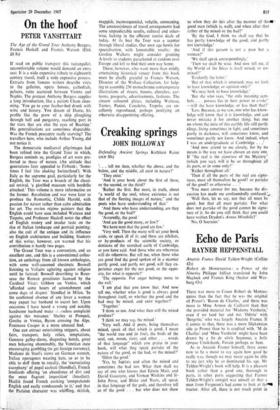Creaking springs
JOHN HOLLOWAY
. . tell me then, whether the above, and the below, and the middle, all exist in nature?' 'They exist.'
`And is your book about the first of these, or the second, or the third?'
`Rather the first. But most, in truth, about "a world of the soul, whose existence is not that of the fleeting images of nature," and the poets who have understanding of that.'
`And those who have understanding, are they the good, or the bad?'
'Assuredly, the good.'
`And are the good many, or few?'
'We have seen that the good are few.'
`Very well. Then the many will set your book aside, or speak ill of it; and these are nihilists, or by-products of the scientific society, or denizens of the scorched earth of Cambridge, as you have said. And those who are otherwise will do otherwise. But tell me, when those who are good find the good spoken of in a manner partly good, and partly not good, will they ex- perience anger for the not good, or the oppo- site, for what is opposite?'
`The opposite. For anger belongs more to the evil.'
'I am glad that you know that. And now tell me, whether what is good is always good throughout itself, or whether the good and the bad may be mixed, and exist together?'
'Together.'
'I think so too. And what then will the mixed produce?'
`I think we may say, the mixed.'
'Very well.. And if poets, being themselves mixed, speak. of. that which is good, I mean "the world .tree. and its fruit, the birds of the soul, sun, moon, river, and other . . . words of that language" which you praise in your book, will what they speak partake of the nature of the good, or the bad, or the mixed?'
`Often the good.' `Yes, by Jupiter, and often the mixed and sometimes the bad too. What then shall we say of one who knows that Edwin Muir, and David Gascoyne, and Vernon Watkins and St- John Perse, and Blake and Yeats, all speak in that language of the gods, and therefore tell us of the good . . . but who does not show us when they do this after the manner of that,/ good man (which is, well), and when after that rather of the mixed or the bad?'
'By the God, I think we shall say that he has partly knowledge of the good, and partly not knowledge.'
'And if this person is not a man but a woman?'
'We shall speak correspondingly.'
`Then we shall be wise. And now tell me, if the World of the Ideas is itself mixed, or un- mixed?'
'Evidently the latter.'
`But of that which is unmixed, may we look to have knowledge, or opinion only?'
`We may look to have knowledge.'
'But she who says, "the only meaning sym- bols . . . possess lies in their power to evoke" —will she have knowledge, or less than that?'
'Less. Because, as we saw, one who has know- ledge will know that it is knowledge, and can never mistake it for another thing; but one on whom the mire of this earthly life still partly clings, living sometimes in light, and sometimes partly in darkness, will sometimes know, and sometimes partly not know. And indeed, when I was an undergraduate at Cambridge . .
`And now attend to me closely, for by no means is the way we have chosen an easy one. If "the real is the signature of the Mystery" (which you say), will it be so throughout all its parts, or in some only?'
`Rather throughout all.'
'Then if all the parts of the real are signa- tures, must all themselves be good? or partake of the good? or otherwise . .
`You must answer for me, because the dis- cussion has made me confoundedly confused.'„4. 'Well then, let us say, not that all must be good; but that all must partake. For what does not partake of the good cannot be signa- ture of it. So do you still think that you could have written Dryden's Annus Mirabilis?'
`No, 0 Socrates.'










































 Previous page
Previous page